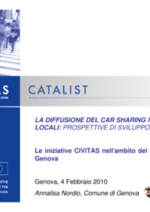About the project
CIVITAS CARAVEL aimed to improve quality of life in the participating cities by tackling urban mobility issues through public-private partnerships, stakeholder consultations, awareness raising activities and research.
The four CARAVEL cities were already well known in their respective countries as pioneers of innovative urban mobility policies. The experiences gained and lessons learned from measures implemented in the 1990s clearly indicated that single and isolated activities had only had a marginal impact and were therefore no longer appropriate in the face of existing urban problems. It was clear that only radical changes in urban transport would lead to effective solutions.
In this context, the main focus of CIVITAS CARAVEL was to embed the individual measures into overarching urban policies covering strategic objectives such as quality of life, economic competitiveness and the transfer of experiences. As the four project cities faced similar problems, there was a pronounced emphasis on the sharing of experiences among these cities and beyond.
CIVITAS CARAVEL comprised a package of integrated measures to meet the following key objectives:
- establish effective public-private partnerships;
- involve stakeholders in the planning and implementation process;
- implement extensive awareness-raising and marketing activities; and
- monitor and evaluate project activities through continuous research.
Implementing sustainable mobility
CIVITAS CARAVEL measures included large-scale demonstration activities with a substantial impact, such as the extension and enforcement of access restriction zones; improvements to road and parking pricing; and the development of freight distribution schemes.
A total of 54 integrated measures were implemented during the project, covering all CIVITAS policy fields. Examples are provided below:
- Genoa enhanced its car-sharing system by the addition of specially adapted cars for disabled drivers and by introducing the shared use of cars by private individuals and public institutions, with a more energy efficient fleet. The access control scheme was extended through a pricing scheme for goods distribution in the city centre, based on a mobility credit concept. All stakeholder needs were taken into account during the development phase. The measure led to changes in delivery behaviour, resulting in fewer vans and cars circulating in the historic city centre.
- Krakow implemented the first demand-responsive (bus) service in Poland. It was the result of a real transfer of ideas and IT solutions from Genoa to Krakow. Krakow introduced an integrated ticket covering public and private transport operators from the city and the region, and took steps towards opening a transfer centre where interested cities can find vital information for their own mobility projects. Krakow was the first city in Poland to implement a public bike scheme.
- Burgos devoted considerable efforts to stakeholder participation, including representatives from the general population, shopkeepers, hotel owners, technology providers, consultants, and relevant departments of the city council. This created a momentum in urban development projects, enabling Burgos to improve the quality of the historic city centre by introducing selective access restrictions for motorised transport in sensitive areas, and enhancing the accessibility of central areas by significantly improving the quality of public transport. Burgos received several awards for its efforts.
- Stuttgart extended its existing car-pooling system. Many companies in Stuttgart and the region – including some of the world’s leading enterprises in the automobile and IT sector – have integrated the system into their intranets and many towns in the region have set up links on their internet sites to the car-pooling system. Football stadiums and the local zoo were also integrated into the system. Stuttgart hosts Germany’s first integrated traffic management centre, where the city traffic management, the police, the fire department, the emergency services and the public transport operator work together under one roof.
Project results
The results of CIVITAS CARAVEL activities included the following:
- Access restrictions were further extended and enforced in city-centre areas of Genoa and Krakow. In Burgos and Stuttgart, new access restriction zones were created.
- In Krakow, an integrated mobility plan was developed containing strategies for the promotion of sustainable mobility forms, such as the creation of better connections among campuses, the creation of bike paths, and a new car parking policy. As a result of this measure it was possible to reduce the number of car trips by 20 per cent among extramural students.
- Genoa developed an integrated pricing and access restriction strategy, covering 2.5 square kilometres of the city centre.
- A total of 50 improved information systems and devices were installed in Genoa, Krakow and Burgos (touch screens, on-board displays in buses, information signs and kiosks).
- 23km of new bike paths were constructed in Burgos and a city bike sharing system with 100 bicycles was created in Krakow.
- Heavy through traffic was banned from the centre of Stuttgart. The ban was introduced in January 2006 for all heavy duty vehicles (HDV) with a total weight of more than 3.5 tonnes. The reduction in the number of HDVs varied between 5 percent and almost 30 percent in different locations in the city. On average, there was a reduction in heavy vehicles of roughly 10 percent for the entire city area. The emissions reductions resulting from this measure were calculated at approximately 8 percent for particulates and nitrogen oxide.
- In Burgos, the implementation of the integrated access restriction strategy resulted in a dramatic reduction in the number of vehicles crossing the city centre. In 2008, only about 10 percent of the car trips recorded in 2004 were observed.
- Car sharing in Genoa showed a growth rate higher than that for Italy as a whole. During the four-year CARAVEL project period, the number of registered users rose sharply from 500 to over 2,200 in 2008. The adoption of car sharing led to a reduction of about 1,000 cars in the city.
Cities
Fast Facts
February 2005 - January 2009
Project duration
22 partners
Project partners
€ 29,784,817
Project funding
54 measures
Measures implemented



















